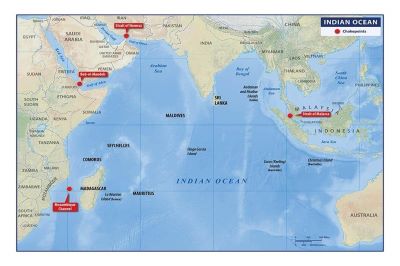Context:
The safety and security of Indian seafarers have become increasingly precarious in light of recent attacks on commercial ships in sensitive maritime zones such as the Red Sea and the Strait of Hormuz. Amid growing concerns, India has proactively engaged with the International Maritime Organization (IMO), submitting three crucial papers addressing various maritime security challenges and advocating for improved contractual conditions for seafarers. These submissions, made during the 111th Session of the IMO's Legal Committee, underscore India's commitment to safeguarding the rights and well-being of its seafaring workforce while addressing broader maritime security issues on the international stage.
Maritime Security Challenges:
Sea piracy has resurged, with recent attacks off the coast of Somalia signaling a troubling trend. Vessels like the MV Ruen and MV Lila Norfolk have fallen victim to Somali pirates, prompting India to call for vigilance, proactive measures, and international cooperation in accordance with the United Nations Convention on the Law of the Sea. Furthermore, India has emphasized the impact of unlawful recruitment practices on seafarers' well-being and international trade, citing over 200 cases of seafarer exploitation reported since 2020. These challenges underscore the need for comprehensive international coordination to combat piracy, armed robbery, and other maritime threats effectively.
The vulnerabilities faced by Indian seafarers have been underscored by recent incidents such as the seizure of the MSC Aries and the detention of MT Heroic Idun in Nigeria. These events, coupled with a survey revealing the lack of legal representation and awareness of rights among seafarers, highlight the urgent need for enhanced international cooperation to ensure uninterrupted navigation and safeguard the rights of seafarers globally. India's advocacy for improved contractual conditions and enhanced security measures reflects its commitment to addressing these challenges comprehensively.
The 'Human Rights at Sea' Initiative:
In response to the challenges faced by Indian seafarers, the Indian government and the National Human Rights Commission (NHRC) have launched the 'human rights at sea' initiative. This initiative aims to address cases of seafarers being held in foreign jails, stranded in foreign waters, and subjected to illegal detentions. Reports have highlighted instances of abuses against Indian seafarers, including cases of imprisonment and extended periods of strandedness in foreign territories. The NHRC has emphasized the need for proactive cooperation among stakeholders to protect human rights in the maritime industry and hold ship owners accountable for violations against Indian seafarers.
Maritime piracy poses a significant threat to Indian seafarers, with recent data showing a notable increase in serious piracy incidents over the last 10 months. Armed pirates have targeted cargo ships, endangering the lives of seafarers and highlighting the need for comprehensive land-based solutions to address piracy effectively. Additionally, reports suggest that Iranian shipping companies, in collaboration with international recruiters, exploit Indian seafarers through deceptive recruitment practices, exposing them to exploitation and abuse. These challenges underscore the importance of enhanced rights and protection measures for Indian seafarers operating in global maritime environments.
India's Maritime Aspirations and Challenges:
India, with its significant share of global seafarers, aims to expand its presence in the maritime industry, despite the challenges faced by its seafaring workforce. The COVID-19 pandemic showcased the resilience and professionalism of Indian seafarers, enhancing India's reputation in the global maritime market. However, recent attacks on commercial ships have heightened safety concerns among Indian seafarers, prompting some to consider leaving their jobs due to security fears. This underscores the urgent need for government support and enhanced protection measures to ensure the continued well-being and safety of Indian seafarers.
Conclusion:
In conclusion, the safety and security of Indian seafarers are paramount amid rising maritime threats and geopolitical tensions. India's proactive engagement with international bodies like the IMO and initiatives such as the 'human rights at sea' initiative demonstrate its commitment to addressing the challenges faced by its seafaring workforce comprehensively. However, concerted international cooperation is essential to effectively combat piracy, armed robbery, and other maritime threats, while ensuring the rights and well-being of seafarers worldwide. As India strives to expand its maritime presence, it must prioritize the protection and support of its seafaring community to maintain its position in the global maritime industry.
|
Probable Questions for UPSC Mains Exam
|
Source – The Hindu







